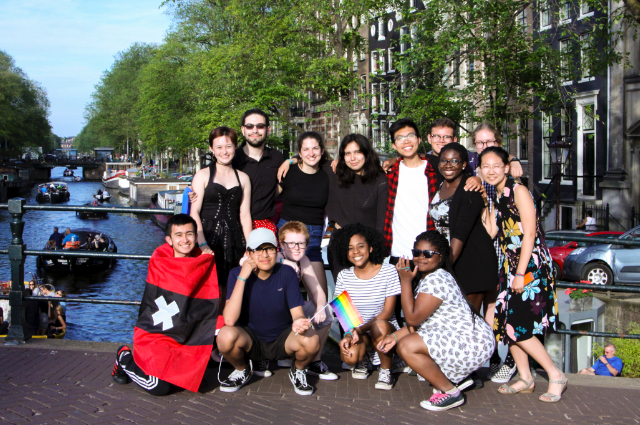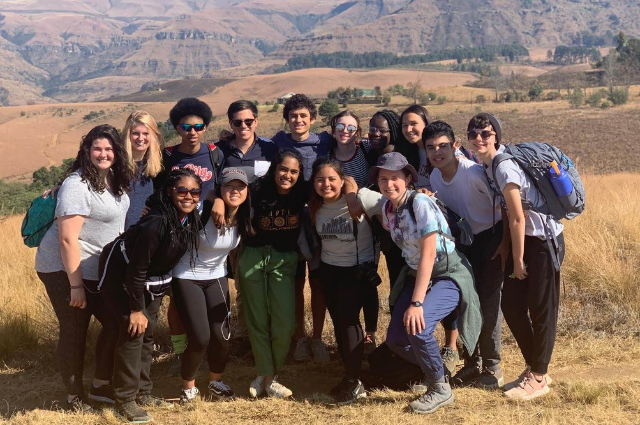Group diversity is a critical component of our programs. Our participants are high school students of different races, religions, gender identities, abilities, countries, and socioeconomic backgrounds. Experimenters may come from historically underrepresented communities, small towns or large cities, urban or rural areas, and from public, private, or home-school educational experiences. We’re experienced in offering programs that meet the diverse needs and interests of our participants and even launched the first-ever LGBTQ+ abroad program for high school students in 2015.
In addition to learning about other countries, participants should expect to learn about the diverse cultures and socioeconomic backgrounds that exist within their own home countries. Our responsibility is to ensure a program experience that allows all our participants to feel valued and to have the opportunity to grow from challenges. Not only are diverse viewpoints celebrated, but we also work to ensure that students have equitable access to our programs by offering an array of scholarship opportunities, and strive to be inclusive of all identities and experiences every step of the way.


Our Approach
Group Leader Training & Inclusive Group Dynamics
We seek educators who represent our diverse student body because we believe that increases the value of our program. Our group leaders represent various geographic, racial, ethnic, religious, and economic backgrounds and are skilled in creating inclusive group environments for their participants. We recognize that we can be doing even more to strengthen our approach to diversity and inclusion within our operations, and we are consistently working to increase the diversity of our leader pool.
All group leaders are skilled in creating inclusive spaces for participants. Staff members attend trainings, lectures, and conferences throughout the year on topics of intercultural education, diversity, and inclusion and how to address incidents like microaggressions within the context of The Experiment’s programs. Group leaders are trained to quickly identify a participant who is feeling unsafe and to provide support when identity-based incidents arise. In addition, some staff also train other organizations and schools on these topics. This information is shared with program partners and facilitators through trainings and workshops before programs begin.
During the program, group leaders empower participants to share in storytelling and learn about each other and their different experiences. The role of our facilitators is to set the groundwork and enable learning in a space and manner so that all participants can process, understand, and reflect. At the start of all Experiment programs, participants work together to build a group constitution. Students use this living document to guide how they’re going to treat each other, how to make the group a safe space for everyone, and how they will address it when it’s not.
Our group truly showcased diversity coming from eight states, ranging in years of 15 to 17, and exemplifying all different backgrounds and stories. We are extroverts; we are introverts; we are athletes; we are performers; but most importantly, we are family. We all bring something different to the table, but one thing we all share is an interest and appreciation of different cultures, beliefs, and people.
Recruitment, Scholarship & Partnerships
We work with more than 40 partner organizations to recruit participants that represent the diversity of their communities. Every year, about 50 percent of our students come through partner scholarship programs and partner schools or receive scholarships from our generous donors. In fact, The Experiment has offered scholarships to young people from different geographic, racial, ethnic, socioeconomic, and other backgrounds since 1940. Our broad coalition of partners and funders includes after-school programs, community groups, public and private schools, and foundations across the world. Learn more about The Experiment’s scholarship and financial aid opportunities.
Our partners are essential not just in recruiting participants but also in ensuring that they are supported before, during, and after the programs. Partners help place students in compatible programs related to their interests and talk them through logistics that can feel overwhelming—like how and what to pack, handling the health screening process, and the homestay experience. Our admissions team coordinates closely with partners to ensure students receive the assistance they need to make the most of their program experience and that they thrive during re-entry.
If you are an educator and would like to form a scholarship partnership with your school or community-based organization, please contact us.
Extending Our Reach through Virtual Exchange
To reach students who are unable to travel or otherwise marginalized from traditional exchange programs, in 2016, we launched The Experiment Digital, a dynamic exchange that retains The Experiment in International Living’s longstanding model of experiential learning and emphasis on forming meaningful relationships and moves it into a virtual space. Using popular digital platforms for teens like Canvas, Padlet, and Zoom, our virtual program model gives young people the opportunity to build international friendships online. Peer-to-peer engagement, combined with carefully designed activities, allows students to learn from one another and together develop knowledge and attitudes that foster cultural understanding.
Virtual exchanges diversify the learning experience by enabling more young people to enjoy a meaningful intercultural experience as part of their education. From 2020 to 2023, The Experiment Digital reached more than 3,000 participants from around the U.S. and across the Middle East and North Africa region. Our post-program survey results indicate that the program has led to substantial changes in students’ attitudes, skills, and perceptions.
Diversity by the Numbers
In the summers of 2020 and 2021—for the first time in our nearly 90-year history—The Experiment was unable to send students abroad because of the COVID-19 pandemic. In 2022, we returned to travel programming. These numbers reflect our summer 2023 Experiment groups abroad:
- Experimenters came from 28 U.S. states.
- Experimenters came from five countries: Ethiopia, France, Oman, Saudi Arabia, and the United States.
- The average Experiment group had 14 participants with two adult group leaders.
- $900,000 in scholarships were awarded to summer 2019 Experimenters, including $252,000 paid for by 40+ partner organizations/schools.


